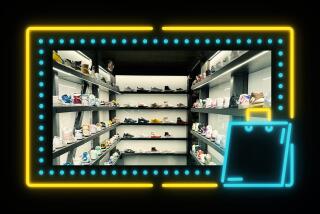Choosing a hardware store, like choosing a bar, is partly subliminal.
- Share via
A house move last week brought me back to a neighborhood institution that I had neglected of late.
I’d like to say it was the local saloon. I’ve always intended to become a habitue of a bar someplace, a local hangout where people would greet me by name and cry for me the day I said goodby.
The truth is, though, that in 12 years in the neighborhood I didn’t make much progress on that. Instead, I got to know hardware stores.
There are a lot of them, I’d say almost as many as there are bars and auto parts stores. And they’re just as invisible to someone who isn’t looking for one. You could drive by a hardware store every day and not see it, until that dreadful Sunday afternoon when you find yourself desperate for a 12-cent rubber compression washer for the bathroom sink.
I’ve spent a lot of time and money in hardware stores. I bought my first Vaughn hammer from Highland Park Hardware when I was a teen-ager. It lasted 20 years. Most of the thousands of nails it drove came from Fleming Lumber on San Fernando Road, or Baller Hardware and Building Materials on Hyperion Avenue, or Peerless Hardware on Sunset Boulevard.
Choosing a hardware store, like choosing a bar, is partly subliminal. Some are better stocked than others or more spacious or more handsomely displayed.
What draws me to a hardware store is character, both the inherent character of the things it sells and the character of the people who sell them.
On the inside, most hardware stores are as full of lore and society as they are of tools. Lots of them carry family names, and you can usually count on finding the patriarch, or the entire progeny, there to listen carefully as you pathetically describe a 10-32, inch-and-a-quarter flathead machine screw in your own words.
There are generations of Ballers at Baller Hardware and Building Materials on Hyperion Avenue. A son and three grandsons work the aisles. The gravelly voiced woman behind the cash register on Saturdays and Sundays is Edith Baller, who has worked there since her late husband Edward built the store in 1959. Slightly earlier that year, brothers Jerry and Paul Laska bought Peerless Hardware. It was in a building that was built in 1945, when the store moved from across the street.
Peerless has always been my favorite. Its quarters are tight and buzz with an energy that seems to reflect the diverse and industrious Echo Park neighborhood it serves. Grizzled landlords in T-shirts or coveralls carrying sections of ancient rusted pipe share its narrow aisles with young householders who seem to be restoring old houses.
There are no frills here and only a couple of shelves devoted to kitchen appliances, which seem to be gathering dust. The businesslike temperament is set by row upon row of wooden gray bins overflowing with copper pipe fittings, electrical outlets, washers and faucet stems. Paint and drainpipe fittings are stacked on shelves against the wall and can be reached only by employees on rolling wooden ladders.
Getting help at Peerless is a multicultural experience.
Jerry and Paul and half a dozen Jewish men and young Latinos fan out through the aisles in a seemingly chaotic system that radiates from an old wooden help-counter in the middle of the store. In a low room in back, a friendly man who speaks English gently, but with difficulty, repairs screen doors and sash windows that customers bring in. For years Luis Silva was master of the shop. He handled his materials like an artist, to a background of Spanish-language radio. About three years ago he left. Now his seemingly identical cousin Rudy has taken over the job.
The last few years I’ve drifted more often to Baker’s on San Fernando Road. I don’t know why. Possibly it started with a drip watering system for some potted plants.
Recently, I haven’t been to hardware stores much at all. Things were running pretty well at home.
Then moving day came and there were faucets to fix, three-pronged electrical sockets to buy, sprinkler systems to automate.
I realized that I didn’t know a single hardware store north of the 134 Freeway or east of Figueroa.
My closest old haunt would have been Jim Rossi’s Home Center on York Boulevard, or Sam’s across the street. Somehow, though, the freeway drew me to Virgil’s Glendale Hardware Center on Central Avenue, a supermarket of a hardware store that sells Cuisinarts and $700 barbecues along with the basics.
Virgil Brinkman opened it back in the ‘50s and later bought out Glendale Hardware, which had been around since 1919. His son Robert, now the owner, isn’t around much, an employee told me.
But, in the plumbing aisles, I found a white-haired man I remembered from visits many years before.
Wes Nelson is his name. He’s the kind of guy who can look at a 30-year-old washer from a Crane faucet from halfway across the room and go right to the steel bin that has them.
In hardware, some things never change.
More to Read
Inside the business of entertainment
The Wide Shot brings you news, analysis and insights on everything from streaming wars to production — and what it all means for the future.
You may occasionally receive promotional content from the Los Angeles Times.











